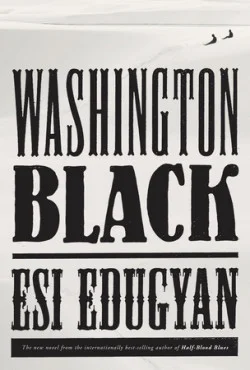REVIEW: From a Barbados Sugar Plantation to Freedom, or Something Like It
/Washington Black by Esi Edugyan
Knopf 332 pp.
By Celia McGee
Early on, a young George Washington Black learns from an older slave on the chafingly named Faith Plantation about the Dahomeyan belief that death is a door opening into the ancestral spirit realm back in the African homeland. To those suffering relentless, soul-killing bondage on the British island of Barbados, this idea holds out freedom. And under the intolerable cruelty of a new master, that unearthly threshold starts to lure more and more to suicide, until, by the side of yet another dead body, “the master calls out… ‘No man shall be re-born without his head,’” As a reminder, the overseer goes to work with a skinner’s knife, and a spike is erected to display the head of a slave who took his own life.
In Washington Black, the course the Afro-Canadian writer Esi Edugyan lays before the inquisitive boy is defined instead by doors in the world of the living. She carves that story into history as irreversibly as the F branded on his chest, taking full possession of the era that gives birth to him in 1818. She engages, blisteringly, with the tradition of the slave narrative, transposed to Great Britain’s colonies, with “Wash”—his full slave name bestowed in ridicule--relaying his sweeping, often epic encounters with the period from the vantage point of 1834, the year the United Kingdom abolished slavery. The telling is couched in a gentlemanly language of detailed recollection. Its personalized claim on slavery’s annals summons up interesting company. Its associations radiate intellectual and social concerns of a time swept up in the study of nature, the inquiries of science, the urge toward exploration, and the fray of politics. The tensions of class reverberate, as do the meaning of family, the vitality of art, the pressure points of love, and the mystery of the self.
The era Wash inhabits has been called “The Age of Wonder,” flying the flag for Romanticism, touting the value of astonishment. Wonder, it turns out, is Wash’s stock-in-trade. Even in the form of anger or despair, it’s an emotion inseparable from his memories and observations. Reluctant though he is, his first visit to the Great House at Faith overwhelms him with the “impossibly beautiful,” with “wonders” of “White lace, silver candlesticks, wood polished to so lustrous a sheen it looked like fresh bread.” With the arrival of Titch (short for Christopher), the master’s scientifically minded, abolitionist brother, who strides into Wash’s destiny by requesting him as his man servant, his capacity to marvel will feature blazingly from then on. Edugyan, a 2011 Booker-prize finalist for her novel Half-Blood Blues, makes a habit of producing the unforeseen, only to snatch it back for a different contortion of chance. This week she was announced as a Man Booker-prize finalist for Washington Black.
To no one’s surprise more than his own, Wash, “raised on chains and blood” to feel otherwise, possesses an extraordinary intellect. Assisting Titch in cataloguing the natural world of the plantation and its surroundings, he discovers moreover a gift for drawing that will further re-make a life perpetually juggling beauty with ugliness. Permanently disfigured by Titch’s bungling of an experiment with a prized hot air balloon, he perfects the art of looking, and of courage. Escape from the island in Titch’s Cloud-Cutter unfurls a map to the unknown—a cemetery with subterranean access to the Underground Railroad, an expeditionary camp in the Arctic, a wary stay in Loyalist Canada, and London digs as an artist, an inventor and a man in love.
Barely anywhere does Wash find freedom from prejudice, often violent. His remarkable travels are in part bound to the necessity of outsmarting a slave-hunter on his trail, and of finding the Titch who suddenly disappears on him into the ghostly dangers of polar snows. His sense of wonder can’t also but turn, darkened, to the constancy of suffering, abandonment and wrongdoing, to the mocking persistence of evil. Edugyan contains in him multitudes—the highs and lows of a yearning Romantic--a man freed from bondage only to find it haunting his actions and his thoughts.
Some of Edugyan’s best writing surfaces in Wash’s exhilaration at seeing nature up close, and his triumphantly revealing its stunning realities--especially its submerged marine life--in his increasingly sought-after illustrations. Her words light a fire under arresting experiences and cloud-clearing ascensions to new heights. Empowered to share his findings, Wash steps up his ambitions with the creation of revelatory showcases, miracles of modern ingenuity for the elegant pavilions of science. After liberation from enforced ignorance into prodigious accomplishment he wants his place in history, and the opening of doors kept closed on the assumption that his name doesn’t qualify for the historical record, reserved as it is for white ones. This is death of another kind. When obliteration tries to leave its calling card questions always arise about whether to intervene in prevailing decisions about posterity’s contents. Washington Black gives life to such choices, siding with better judgments, and contributing a moving chronicle.
Celia McGee is a culture journalist and book critic in New York, and a board member of The Center for Fiction.










